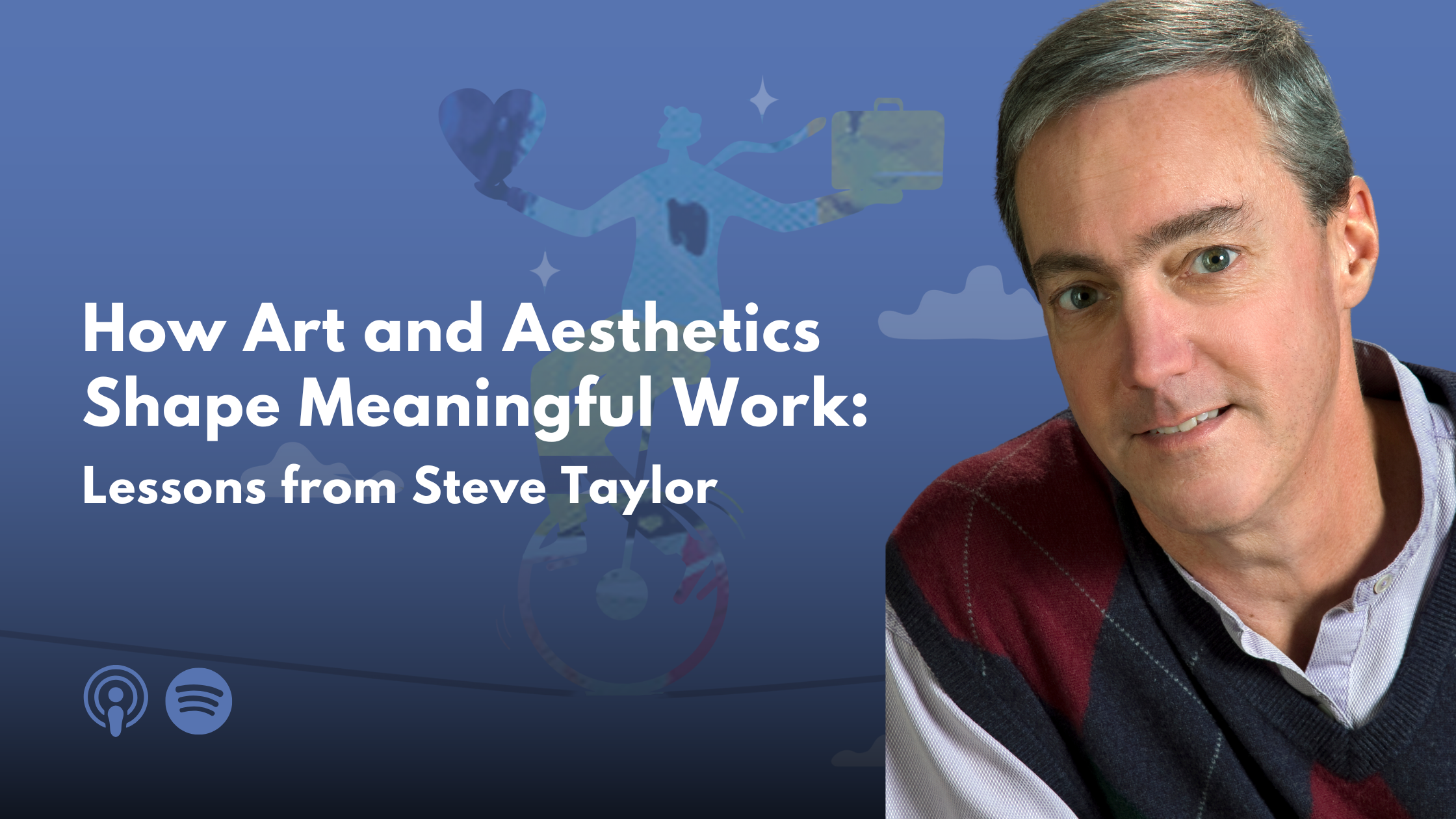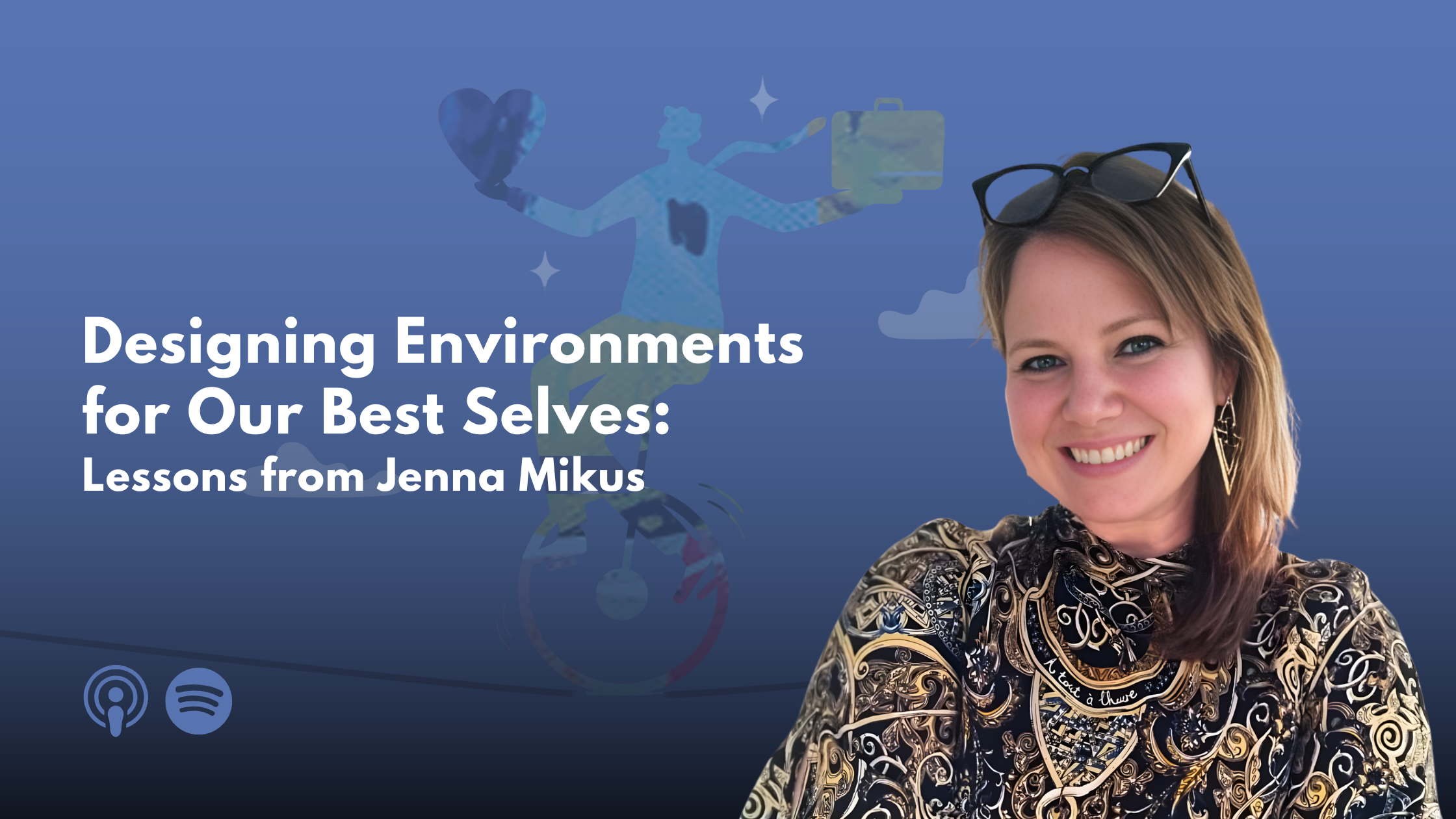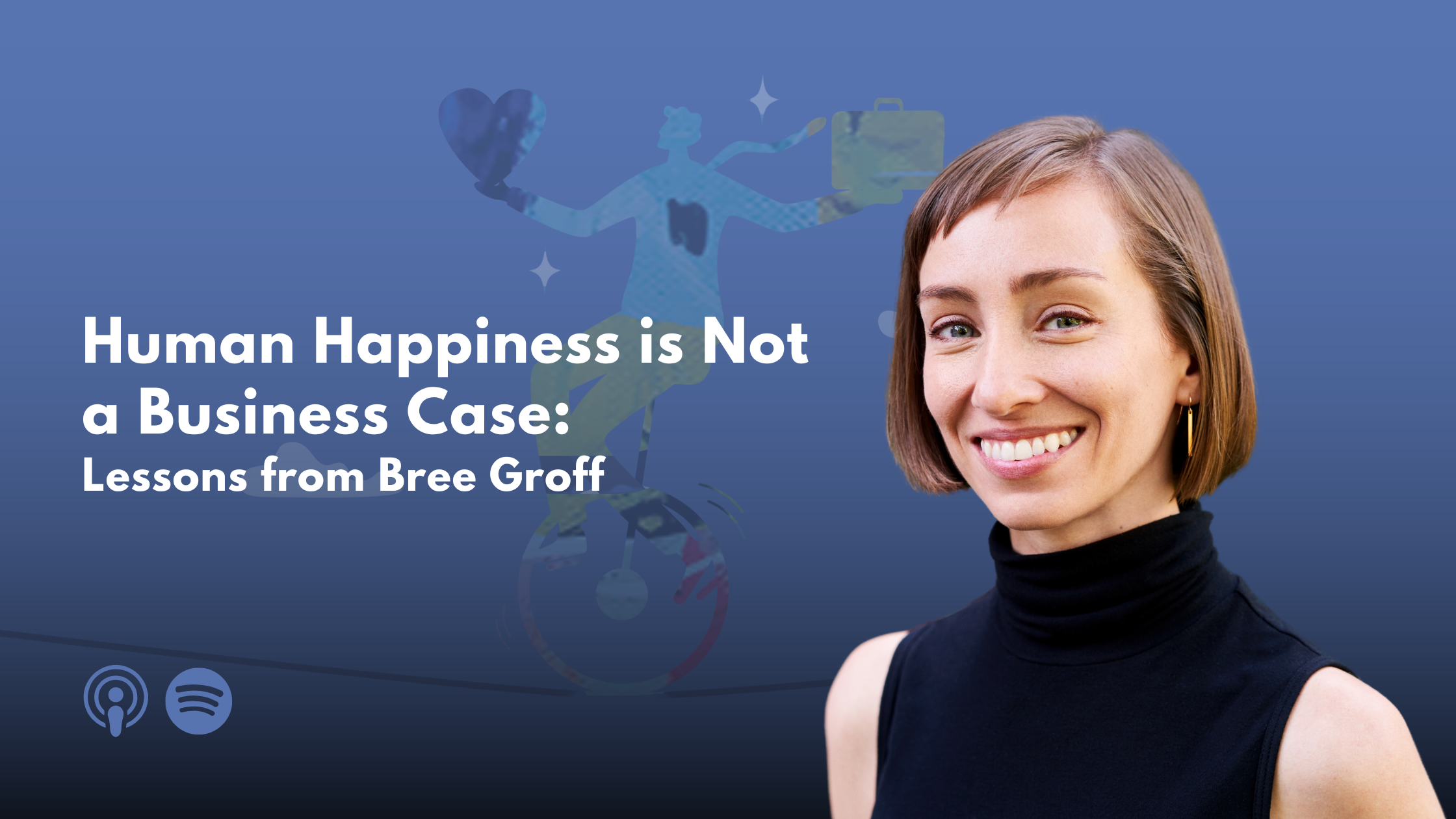In this episode of Meaningful Work Matters, Andrew speaks with Steve Taylor, professor of leadership and creativity at the WPI Business School. Taylor’s work lives at an unusual intersection of organizational life, ethics, and the arts. He studies not only how people think about work, but how they experience it through their senses, their bodies, and their relationships.
Taylor argues that our dominant ways of studying and designing work privilege logic, metrics, and language, while ignoring sensory knowing, aesthetic judgment, and embodied experience. When those dimensions are excluded, something essential about work disappears.
This matters now more than ever. As organizations become more automated and abstract, and as AI absorbs more analytical and linguistic tasks, the distinctly human capacities of discernment, judgment, and aesthetic sensitivity become harder to ignore. Taylor invites leaders and practitioners to consider a different way of knowing work, one that values not having the answer, staying close to experience, and learning through artful practice.
Meaning Is Experienced
A core theme of the conversation is that meaningful work is something we feel before we explain it. Taylor draws on the tradition of organizational aesthetics, which traces back to the original meaning of aesthetics as sensory perception rather than beauty or surface appearance.
He explains that humans apprehend the world first through sensation.
“We actually know things through sensory knowing, through the direct experience of our senses.”
We notice tone and rhythm, moments of tension or ease, and subtle forms of discomfort that shape how work is experienced long before it is interpreted. Only later do we translate those sensations into emotions, and later still into concepts or explanations. In organizational life, however, this sequence is often reversed. People are asked to articulate purpose and meaning in abstract terms, while the sensory conditions that make work feel enlivening or draining remain largely unexamined.
Taylor suggests that this gap helps explain why many conversations about work feel thin or disconnected. People can describe what should matter, yet struggle to connect that language to lived experience. Aesthetic awareness offers a way back into that connection by inviting questions such as what a meeting feels like in the body, where resonance or dissonance shows up, and how the texture of a workday shapes engagement over time.
These questions influence how people relate to one another, where they withdraw, and how commitment forms or erodes. Meaning emerges through relationship and felt experience with others, shaped by everyday interactions rather than individual reflection alone.
Art as a Way of Knowing What We Cannot Say Yet
Taylor’s own path into this work emerged through playwriting. When he was unexpectedly laid off early in his career, he did not begin by analyzing the experience. Instead, he wrote a scene, which later became a play. Through that process, the experience took form outside his body, making it easier to see and engage with.
Years later, he returned to the same experience through cognitive analysis, at which point the emotional and sensory work had already been done. The art had created a foundation for understanding by giving shape to something that initially felt overwhelming and difficult to articulate.
This pattern appears throughout Taylor’s work.
“Art allows you to make your feelings object in the world, so you can see them and others can see them.”
Art allows people to make inner experience visible, even when its meaning is not yet clear. As Taylor puts it, art makes feelings “object in the world,” where they can be seen, shared, and reflected on.
He does not frame art as a replacement for analysis, but as a companion that often comes first. Cognitive frameworks tend to land more effectively after experience has been processed at a sensory and emotional level. Without that grounding, analysis can drift away from what people are actually living through.
This is part of what gives arts-based methods their power in leadership and organizational development. They surface what is already present but unspoken, bringing forward tensions, contradictions, and patterns that formal language often smooths over.
Seeing Power and Complexity Through Aesthetic Practice
One of the most practical dimensions of the conversation focuses on how aesthetic awareness changes the way people perceive power and interaction at work.
Taylor describes using techniques from theater, particularly status work developed by Keith Johnstone, to help students and leaders recognize the micro-dynamics of power that shape everyday interactions. Status reveals itself through posture, eye contact, pacing, and tone, with people enacting higher or lower status constantly, often without conscious awareness.
When participants work with these dynamics physically, insight begins to emerge in ways that discussion alone rarely produces. Small shifts in behavior start to feel consequential. A leader who lowers their physical stance can invite openness, while a team member who becomes aware of habitual self-minimization can experiment with different ways of showing up.
Beyond power dynamics, the arts also help people stay with complexity rather than rushing toward simplification. Taylor references research comparing traditional leadership training with arts-based learning, where participants who focused on leadership theories tended to reduce complexity, while those who engaged deeply with art, music, and literature developed a greater tolerance for ambiguity.
This distinction matters because expertise does not eliminate complexity.
Leadership depends on discernment, the ability to sense what matters in a given moment, and art trains this capacity by resisting easy answers and inviting sustained attention.
The Risks and Limits of Bringing Art Into Organizations
Taylor is clear that arts-based approaches are neither neutral nor risk-free. Art can surface experiences that people are not prepared to confront, and in rare cases, it can open emotional material that requires care and support.
Organizations also tend to instrumentalize the tools they adopt. Artistic methods may be used to extract insight without fully honoring what is revealed. Leaders may invite aesthetic exploration with curiosity, only to recoil when it exposes uncomfortable truths about power, culture, or responsibility.
This tension is difficult to avoid. Art reveals rather than reassures, and it resists control. Once work moves into the sensory and experiential realm, managerial certainty begins to loosen, and outcomes become less predictable.
This uncertainty helps explain why many organizations hesitate to engage this territory seriously. At the same time, it points to why the work remains essential. Meaningful work grows out of engagement with what is real, including aspects of experience that cannot be neatly managed.
Discernment in an Age of Automation
As the conversation turns toward the future of work, Taylor introduces a critical idea. In a world where AI increasingly handles analysis and language, human value shifts toward judgment and discernment.
Discernment involves noticing what matters, including what is subtle, missing, or unlikely.
“What I want in a leader is discernment, the ability to notice what matters and know what it means.”
Taylor evokes Sherlock Holmes’ attention to the dog that did not bark, a detail whose absence carried more meaning than what was immediately visible. This kind of perception depends on sensory awareness, experience, and aesthetic judgment developed over time.
As automated systems grow more capable, the human contribution lies less in producing answers and more in recognizing significance. Aesthetic sensibility supports this capacity by helping people sense importance before it can be fully named or explained.
For Taylor, this is where organizational aesthetics and meaningful work converge most clearly. The future of meaningful work rests on cultivating ways of noticing, feeling, and discerning that remain deeply human.
Why This Conversation Matters
This conversation challenges a deeply ingrained assumption about work: that meaning is something we arrive at through clarity and explanation alone. Taylor suggests instead that meaning emerges through attention, connection, and sensory engagement with everyday practice.
For leaders, this reframes responsibility. Leadership becomes less about having the right answers and more about creating conditions for discernment, which requires comfort with uncertainty and a willingness to stay with experience long enough for insight to form.
For individuals, the invitation is both simple and demanding. It asks whether it is possible to stay connected to the senses during even the most mundane parts of work, and whether curiosity can replace abstraction as a default stance.
Taylor ultimately offers a way of paying attention that encourages slowing down, staying close to experience, and trusting forms of knowing that do not always arrive as clear conclusions. In a working world that increasingly rewards speed, certainty, and automation, this orientation may be one of the most meaningful practices available.






















